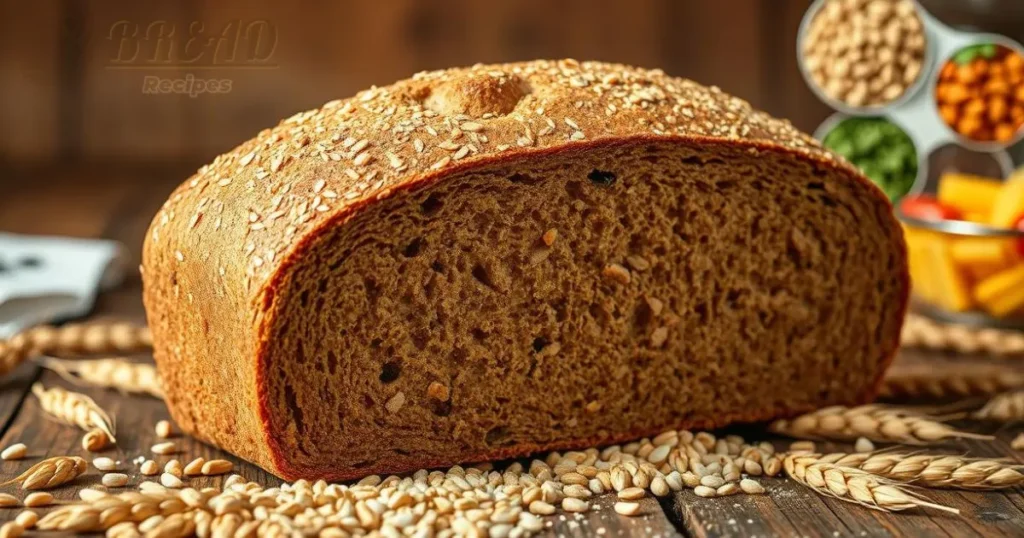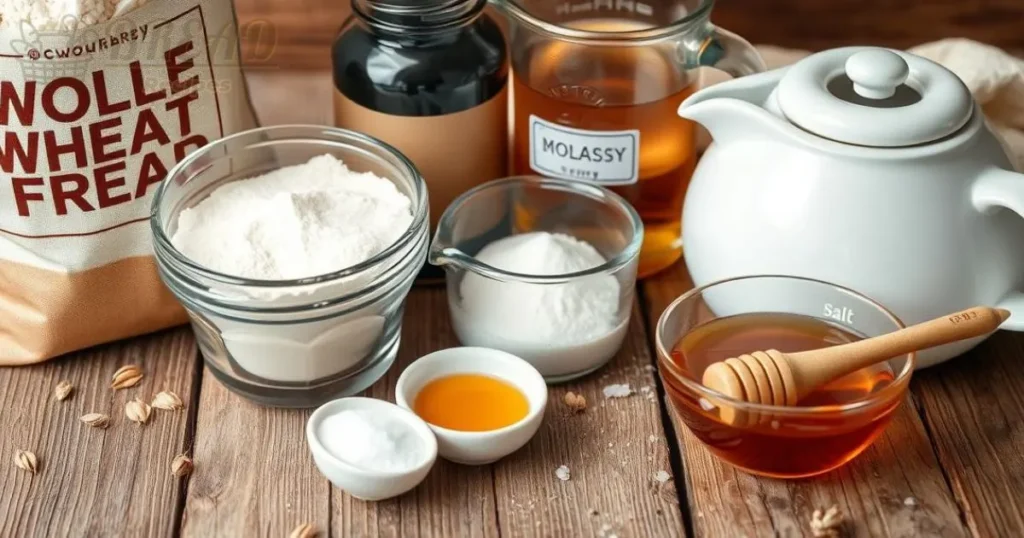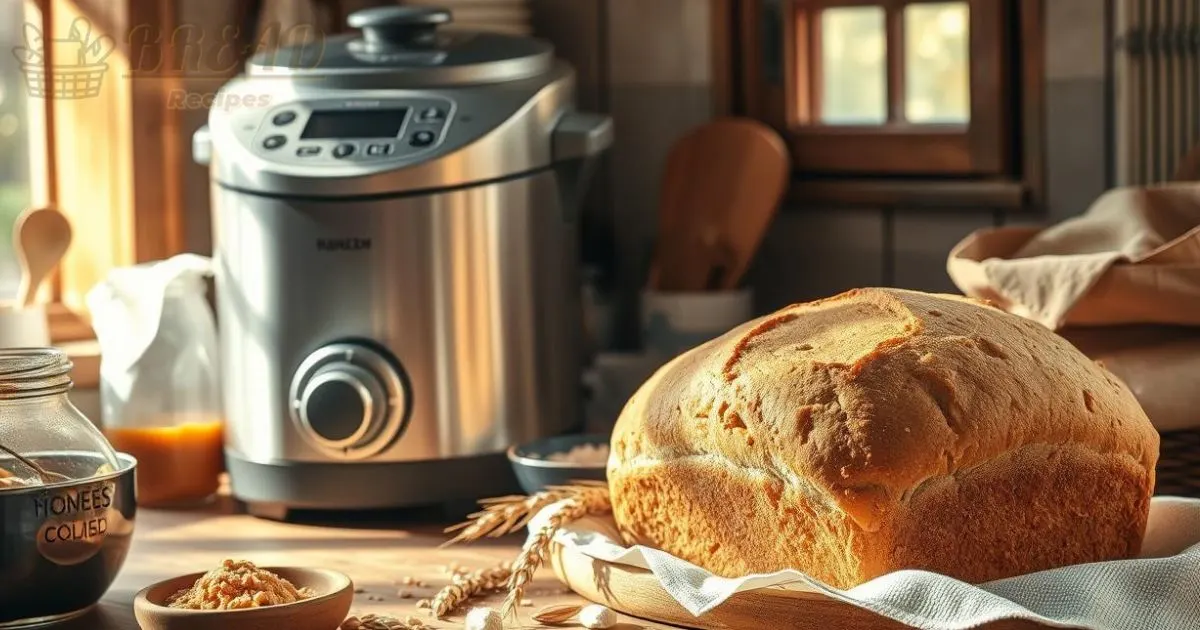Are you tired of bland, store-bought bread? It lacks nutrition and flavor. Discover how to make delicious homemade bread that turns your kitchen into a bakery. It nourishes your family with wholesome ingredients.
Making healthy bread maker recipes is easy. This simple whole wheat flour recipe lets you create a mouthwatering loaf. It’s packed with nutrients and tastes better than store-bought bread.
Our bread machine recipe combines molasses with whole wheat flour. It’s perfect for health-conscious home bakers. They get convenient and delicious bread options.
simple whole wheat bread with molasses bread machine recipe
Table of Contents
Key Takeaways
- Create nutritious homemade bread in less than 4 hours
- Learn easy bread maker recipes with minimal effort
- Leverage whole wheat flour for enhanced nutritional value
- Discover the secret to perfectly textured bread
- Master a foolproof bread machine technique
- Enjoy a healthier alternative to store-bought bread
Introduction to Whole Wheat Bread
Exploring whole wheat bread is a tasty way to eat healthier. It adds a rich, nutty flavor to your meals. This makes every day a little more special.

Discovering bread machine advantages shows how easy homemade bread can be. These appliances make bread making simple. They ensure your bread turns out great every time.
Nutritional Powerhouse of Whole Wheat
Whole wheat bread is packed with nutrients. Here are some key benefits:
- It has more fiber than white bread
- It’s full of important minerals and vitamins
- It’s good for your digestion
- It helps keep your blood sugar stable
Bread Machine: Your Baking Companion
Bread machines make baking easy for everyone. They do all the hard work by:
- Measuring ingredients for you
- Kneading the dough automatically
- Controlling the temperature
- Shortening the time you spend preparing
“Bread machines turn complex baking into an easy kitchen task.” – Culinary Expert
| Whole Wheat Bread Benefit | Nutritional Impact |
|---|---|
| Fiber Content | Supports digestive health |
| Complex Carbohydrates | Provides sustained energy |
| Essential Minerals | Strengthens immune system |
Learning about whole wheat bread and bread machines changes your baking. It turns it into a fun and healthy journey.
Ingredients Needed for Whole Wheat Bread
Making delicious whole wheat bread in your bread machine is easy with the right ingredients. Knowing what to use can make your homemade bread even better.
Essential Ingredients for the Recipe
To make perfect whole wheat bread, you need a few key ingredients. Here’s what you should have:
- Whole wheat flour (100% recommended)
- Water
- Active dry yeast
- Salt
- Molasses

- 1 1/2 cups water
- 2 tablespoons oil (coconut or vegetable)
- 1 1/2 cups bread flour
- 1 1/2 cups white whole wheat flour
- 1/4 cup brown sugar
- 1 1/2 teaspoons salt
- 2 1/2 teaspoons bread machine yeast
Optional Ingredients for Extra Flavor
Want to add more flavor to your whole wheat bread? Try these:
- Flax seeds
- Sesame seeds
- Oatmeal
- Honey (as an alternative to molasses)
Pro tip: King Arthur and Bob’s Red Mill offer exceptional whole wheat flour brands that work wonderfully in bread machines.
Using a bread machine is simple. You can often dump all ingredients together without complex preparation. This makes making homemade whole wheat bread easy for everyone.
Equipment Required
Making tasty whole wheat bread needs the right tools and a good bread machine. Choosing the right equipment is key to your bread-making success.
Choosing the Right Bread Machine
Look for these important features in a bread machine:
- Loaf size options (1.5 lb or 2 lb settings)
- Programmable crust darkness settings
- Multiple bread cycle options
- Digital display for easy monitoring
There are different bread machine types. Some have special settings for whole wheat bread. These settings help get the perfect texture.
Essential Bread Making Tools
You’ll also need extra tools for baking success:
- Measuring cups and spoons for precise ingredient quantities
- Silicone spatula for scraping and mixing
- Wire cooling rack
- Oven mitts for safe handling
| Tool | Purpose | Recommended Type |
|---|---|---|
| Measuring Cups | Accurate ingredient measurement | Stainless steel or glass |
| Bread Machine | Primary baking equipment | Programmable with whole wheat setting |
| Cooling Rack | Prevent bread bottom sogginess | Wire mesh with elevated design |
“The right tools transform bread making from a chore to a culinary art.” – Professional Baker
Quality bread making tools mean delicious results every time you bake whole wheat bread.
Step-by-Step Instructions
Making the perfect whole wheat bread needs precision and care. Your bread machine is your best friend in this baking adventure. Let’s go through the steps to make a delicious, healthy loaf every time.
Preparing the Dough
Starting with the right ingredients and technique is key. Here are the important steps:
- Put ingredients in the bread machine pan in this order:
- Warm water
- Liquid ingredients (butter, oil)
- Salt
- Molasses
- Flour
- Make a small well in the flour’s center
- Put yeast in the well, away from the liquids
Baking the Bread
Choosing the right settings on your bread machine is crucial. Pick these options:
- Loaf size: 2 lb. loaf
- Crust color: Medium
- Bread type: Whole wheat or basic setting
“Patience is key in bread making. Let the machine do its magic!” – Baking Expert
The whole recipe takes about 3.5 hours. After baking, let the bread rest in the pan for 5 minutes. Then, cool it for 5-10 minutes before slicing for the best texture.
| Stage | Duration | Key Action |
|---|---|---|
| Mixing | 15-20 minutes | Combine ingredients thoroughly |
| First Rise | 45-60 minutes | Allow dough to develop |
| Baking | 50-60 minutes | Achieve golden crust |
| Cooling | 10-15 minutes | Rest and set bread structure |
Pro tip: Use a digital thermometer to check bread’s internal temperature. It should reach 190-200°F for perfect doneness.
Tips for Measuring Ingredients
Precision is key in bread making. Getting the ingredients right can make all the difference. Learning how to measure correctly will boost your bread machine skills and ensure great results every time.
For perfect whole wheat bread, measuring tips are essential. Each ingredient needs a specific way to be measured for the best results.
Importance of Accurate Measurement
Measuring ingredients accurately is more than just following a recipe. It’s about knowing how each part affects your bread’s taste and texture. Small changes can make a big difference in your final product.
- Dry ingredients need precise leveling
- Liquid measurements require clear markings
- Temperature affects ingredient performance
Common Measuring Techniques
Professional bakers use certain techniques to measure accurately. Here are some expert tips for precise ingredient preparation:
| Ingredient Type | Measuring Method | Pro Tip |
|---|---|---|
| Dry Ingredients | Spoon and level method | Use straight-edge knife to remove excess |
| Liquid Ingredients | Use clear measuring cups | Check at eye level for accuracy |
| Sticky Ingredients | Lightly oil measuring tools | Helps ingredients slide out completely |
“Precision in measuring is the foundation of great baking” – Professional Baker’s Wisdom
Pro tip: Always keep your measuring tools clean and calibrated for the most accurate results in your bread machine recipe.
Understanding Yeast
Yeast is the magic that makes bread come to life. Whether you’re new to baking or have years of experience, knowing about bread yeast types and how to handle yeast can change your bread-making journey.
When choosing yeast for your recipes, you have several options. Each type adds its own special touch to your baking.
Exploring Bread Yeast Types
- Active Dry Yeast: Needs to be proofed in warm water before adding to dough
- Instant Yeast: Can be added straight to dry ingredients
- Fresh Yeast: Has a short shelf life but gives a rich flavor
Essential Yeast Handling Tips
Managing yeast well is key to making great bread. Here are some important tips to help your bread rise perfectly:
- Keep yeast in a cool, dry spot
- Always check the expiration date
- Measure yeast accurately
| Yeast Type | Activation Method | Shelf Life |
|---|---|---|
| Active Dry Yeast | Requires warm water | 2-4 months refrigerated |
| Instant Yeast | Direct mixing | 4-6 months refrigerated |
| Fresh Yeast | Crumble and mix | 1-2 weeks refrigerated |
“The secret to great bread is understanding your yeast.” – Professional Baker
Temperature is very important for yeast. Keep it away from salt and direct liquid until you’re ready to mix. Warm places help yeast work, but too much heat can kill it.
The Role of Molasses in the Recipe
Molasses adds magic to your whole wheat bread, making it a nutritional powerhouse. It turns an ordinary recipe into something special. Adding molasses to your bread gives it amazing flavor and health benefits.
This dark, rich syrup does more than just sweeten your bread. Molasses benefits go beyond taste, making it a nutritional champion in your baking.
Nutritional Powerhouse of Molasses
Molasses is a nutritional powerhouse. Let’s look at its amazing health profile:
- Rich in essential minerals like iron and calcium
- Provides antioxidants that support overall wellness
- Lower glycemic index compared to refined sugar
- Contains trace amounts of vitamins B6 and magnesium
Flavor Contributions in Bread Making
The right type of molasses can change your bread’s taste. Dark molasses gives a deep, robust flavor to whole wheat bread. Lighter varieties add a subtle sweetness.
“Molasses is not just an ingredient; it’s a flavor storyteller in your bread.” – Artisan Baker’s Wisdom
| Molasses Type | Flavor Profile | Best Used In |
|---|---|---|
| Light Molasses | Mild, Sweet | Lighter Breads |
| Dark Molasses | Rich, Robust | Whole Wheat Breads |
| Blackstrap Molasses | Intense, Slightly Bitter | Specialty Recipes |
Pro tip: When using molasses in bread recipes, start with 1/4 cup per loaf to balance flavor and nutrition.
Adjusting Recipe for Dietary Needs
Bread lovers with dietary restrictions can still enjoy homemade bread. You can find gluten-free or low-sugar bread options. These modifications make the whole wheat bread recipe fit your nutritional needs.
Gluten-Free Bread Machine Variations
Gluten-free bread needs careful adjustments. Here are tips for gluten-free bread machine recipes:
- Replace wheat flour with a gluten-free bread flour blend
- Add xanthan gum for better texture and binding
- Use more liquid because gluten-free flours absorb differently
Low-Sugar Bread Alternatives
Lowering sugar doesn’t mean losing flavor. Here are low-sugar bread options:
- Swap honey for sugar-free sweeteners
- Cut molasses by half
- Try cinnamon or vanilla extract for extra flavor
“Healthy bread is about smart ingredient choices, not compromising taste.” – Artisan Baker’s Wisdom
| Dietary Modification | Recommended Substitution | Impact on Recipe |
|---|---|---|
| Gluten-Free | Gluten-free flour blend | Needs xanthan gum for structure |
| Low-Sugar | Stevia or monk fruit sweetener | Little effect on taste |
Pro tip: Always experiment and adjust liquid ratios when modifying bread recipes to ensure optimal texture and rise.
Troubleshooting Common Issues
Bread machine troubleshooting can solve many problems for home bakers. Knowing the common challenges helps improve your skills. It ensures perfect loaves every time.
Dense or Unrisen Bread Challenges
Several factors can cause bread to not rise well. Yeast quality is key. Keep yeast fresh in the fridge and test it before using.
One packet of dry yeast is equal to 2¼ teaspoons. The best temperature for yeast to rise is between 85°F and 95°F.
- Check yeast freshness before each use
- Verify water temperature (too hot or cold kills yeast)
- Ensure correct protein content in flour (higher than 12%)
Managing Dough Consistency
When troubleshooting, focus on dough consistency. The dough should be soft and slightly sticky during kneading. If it’s too dry, add water slowly.
If it’s too wet, add flour bit by bit.
| Issue | Solution |
|---|---|
| Dry Dough | Add water 1/2 tablespoon incrementally |
| Wet Dough | Add flour 1 tablespoon at a time |
| Yeast Activation | Use water between 85°F-95°F |
Addressing Off Flavors and Odors
Unusual flavors or smells can be a problem. These might mean spoiled ingredients or bad storage. Always use fresh ingredients and store them correctly.
Remember: The quality of your ingredients directly impacts the final bread’s taste and texture.
By learning these troubleshooting tips, you’ll make delicious, perfectly risen loaves every time.
Storing Your Whole Wheat Bread
Keeping homemade bread fresh is key. The right storage tips can keep your whole wheat bread fresh for days or weeks.
Let your bread cool down completely before storing. This stops moisture from causing it to spoil too soon.
Best Practices for Storage
- Store bread at room temperature in a bread box or paper bag
- Keep bread away from direct sunlight and heat sources
- Avoid plastic bags, which can trap moisture
How to Keep Bread Fresh Longer
Keeping bread fresh is simple. Here are some tips to make your whole wheat bread last longer:
- Slice and freeze extra loaves for up to 3 months
- Wrap bread tightly in Glad Press ‘n Seal
- Store loaf end piece against cut side to prevent drying
“The secret to great bread is not just in baking, but in storing it right!” – Artisan Baker
| Storage Method | Shelf Life | Best For |
|---|---|---|
| Room Temperature (Bread Box) | 2-3 days | Immediate consumption |
| Freezer | Up to 3 months | Long-term storage |
| Refrigerator | Not recommended | Avoid – speeds up staling |
Pro tip: To refresh slightly stale bread, toast it briefly or warm in the oven for a few minutes to restore some of its original texture.
Enjoying Your Bread
Your freshly baked whole wheat molasses bread is perfect for many dishes. Its rich flavor pairs well with different spreads and meals.
Creative Serving Suggestions
Turn your homemade bread into exciting meals with these ideas:
- Serve warm with a generous pat of salted butter
- Create gourmet sandwiches with premium deli meats
- Toast and top with avocado for a nutritious breakfast
- Pair with hearty soups and stews
Bread and Spread Pairings
Try these tasty bread and spread combinations with your whole wheat molasses bread:
| Spread Type | Flavor Profile | Recommended Pairing |
|---|---|---|
| Honey Butter | Sweet and Creamy | Breakfast Toast |
| Olive Tapenade | Savory and Tangy | Afternoon Snack |
| Herb Cream Cheese | Fresh and Zesty | Light Lunch |
“A great bread is the most fundamentally satisfying of all foods.” – James Beard
Keep your whole wheat molasses bread fresh for longer. Store it in an airtight container for 4-5 days. Or freeze it for up to 3 months. To reheat, place it in a 300°F oven for 5-10 minutes. This will make it taste like it just came out of the oven.
Conclusion and Final Thoughts
Learning how to make homemade bread in a machine can change your kitchen. White whole wheat flour is a great choice for healthier bread that’s soft. By learning about your machine and trying new ingredients, you’ll get better at baking.
Starting your bread-making journey is just the beginning. Whole wheat bread lets you be creative. You can try adding honey or mixing different flours. Each loaf is a chance to improve your skills.
Homemade bread is more than just tasty and healthy. It builds your confidence in baking and lets you choose what goes into your bread. Even beginners can make amazing loaves with a machine like the Panasonic SD-YD250.
Continuing Your Bread Baking Adventure
Keep trying new recipes and flavors. Your bread machine is a great tool for making healthy, tasty bread. Don’t be shy to try new things and make each loaf your own.
FAQ
Can I make this bread without a bread machine?
How long can I store this whole wheat molasses bread?
Is this bread recipe gluten-free?
Can I reduce the sugar in this recipe?
What type of yeast should I use?
How can I tell if my bread is properly prepared?
Can I add additional ingredients to this recipe?
What are some serving suggestions for this bread?
Source Links
- Bread Machine Whole Wheat Bread – https://adamantkitchen.com/bread-machine-whole-wheat-bread/

